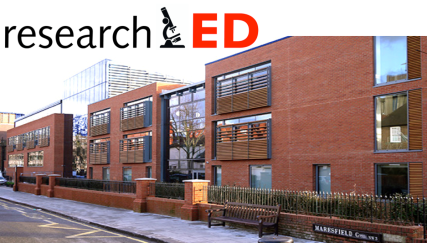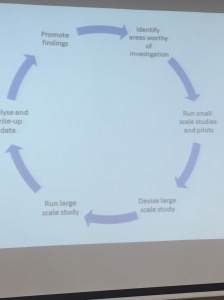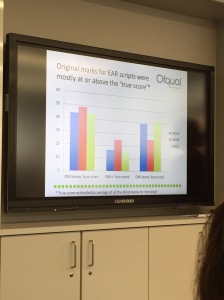I didn’t go to the inaugural ResearchEd conference in 2013. I did, however, get a flavour of the day from my Twitter feed and then, subsequently, from the videoed sessions kindly put together after the event. Ben Goldacre set the tone for an enthusiastic response towards the idea of teaching as more of an evidence-based profession. This desire for a greater research base to inform educational decision-making was perhaps understandable: for too long teachers had been subjected to every unsubstantiated whim of national policy makers, and had born the work load brunt of over exuberant SLTs eager to demonstrate how they were meeting the latest outstanding criteria laid out by Ofsted. Research provided a possible means to challenge the status quo and build something better from the ground up.
As is often the case, early enthusiasm can be followed by cynicism and doubt. And so it came to pass that at last year’s conference, which I was lucky enough to attend, there was a definite air of caution towards the trumpeting of research in education. If Ben Goldacre symbolised ResearchEd13’s rallying cry for education to become more like the medical profession, then Dylan Wiliam struck a more cautious note for teaching and evidence becoming bedfellows. His provocatively titled, ‘Why teaching will never be a research-based profession, and why that’s a Good Thing’ was a message heard in several other sessions I attended that day. Whilst most teachers generally felt an evidence-informed profession was a desirable thing – that was why there were there! – there was uncertainty about exactly what form it should take.
At Saturday’s fantastic third annual conference, held at South Hampstead High School in North West London, it felt like some of these doubts from last year had gone away, or rather that – at least in the sessions I went to or heard about – there was a growing confidence about how research could play a successful (and practical) role within education, one that also takes account of the legitimate concerns articulated previously – the lack of replicated findings; the prevalence of poorly constructed studies, compatibility with craft knowledge, etc. As distinct as each session was, it seemed that the different facets of the profession had begun to work out what their relationship to research and evidence should be, and that there was something close to consistency from these different stakeholders. More importantly, there was greater clarity on the practical benefits of research for teachers in the classroom and for school leaders looking to establish the conditions for great teaching in their schools.
I certainly picked up something valuable from every presentation, an idea or approach that I can and will take back to my school and apply in my context. I’ve picked out four of the sessions that I attended and identified what I took away from the session, which is likely to be idiosyncratic and reflect my own school’s concerns.
Can we learn anything from ‘top performing’ education systems? Lucy Crehan
I was gutted to miss Lucy speak at the Festival of Education earlier in the year. I had dragged @teachertweeks half way across the school to hear Lucy, only to meet with a shut door and a queue of disgruntle edu-punters. I was not going to make the same mistake again and so arrived earlier to get a seat. Lucy’s talk concentrated on the ways in which international evidence is often used incorrectly by governments to make policy decisions. Lucy has visited a number with different education contexts, including Finland, Canada, New Zealand and Singapore, and spent time digging beneath the surface headlines to find out a lot about how their systems work. Her accounts of different jurisdictions are fascinating and will no doubt make a great read when she gets round to writing them up in her crowd-sourced book, Cleverlands. There were many interesting observations about both the nature of different education settings and how data from these environments can be and has been misapplied by governments looking simplistically at other systems for solutions to their own educational problems.
# Takeaway point 1
In high performing systems that operate benchmark standards for student achievement Lucy talked about the amount of early intervention to address underperformance, often before the achievement gap gets too wide to do anything about. There are no higher standards (or objectives) for higher attaining students, though in reality they do learn, do and know more than their weaker peers. This struck a chord with me and helped me think more about how we get to grips with intervention whilst there is still time.
Hack your own teacher-researcher career – Becky Allen
I think it is fair to say that Becky is not really a big fan of everyone becoming teacher researchers; she believes ‘almost all teachers should never do education research’ – it is just too small scale and often poorly constructed to provide anything of any real value to the wider profession. In truth, she is not against the notion of the enquiring practitioner per se, just that it may not be the best of use of a teacher’s time and that it is never going to be the kind of thing that brings about system-wide change or the type of research that her organisation Education Datalab is interested in looking at. What Becky does like, and speaks passionately about, is big data: the size and scale of studies that can and should be used across systems to provide teachers with an evidence base to help them inform their practice. Becky’s talk outlined how those intent on contributing towards this kind of research could go about it, avenues open to teachers today that were not available to her when she forced to take a sabbatical to pursue further studies in research. Becky is an inspiring individual, though I tend to look more favourably on the potential of individual disciplined enquiry than she does.
# Takeaway point 2
The 10 step process that Becky used to explain how a willing teacher could get more involved in large scale research is a fantastic sequence of steps that I will definitely draw upon to help develop the lead learners at my school, and to encourage more teachers to engaged with research in all its different forms. We may not be conducting large-scale studies here, but we can get better at our own classroom enquiry.
The swimming pool and the marathon: prioritizing cognitive and character development – Eric Kalenze
Personally, I thought Eric was a bit of a star turn. Not only was his talk excellent, but his passion for the event itself and his obvious amazement at what Tom and Helene have created over the last few years was a clear reminder of the extraordinary power of the ResearchEd initiative. Sometimes it takes an outsider to help you appreciate exactly what you have got right in front of you, even if it means that you have to unwittingly be part of a group selfie to prove to the folks back home that you exist! Eric’s talk drew upon one of the chapters of his recent book, Education is Upside Down, which though I have not yet started, am reliably informed is excellent. It is clear from Eric that the American education system is facing many of the challenges that are only too familiar to those working on these shores, such as the overcorrection to curriculum time for teaching soft skills caused by the Dweck-Duckworth juggernaut. Eric skilfully explored the pitfalls (and lack of evidence) of trying to teach non-cognitive skills in an isolated way, reminding us that even the notion of certain character traits may themselves be circumspect. For example, how many people have ever cleared their drive of snow out of intrinsic motivation? Eric doesn’t. His drive remains snow-free to ensure a wife happy and keep a marriage intact.
# Takeaway point 3
I learnt a lot from Eric about how a warm smile and upbeat manner can allow you to get in some pretty devastating critiques without ever appearing polemic or dismissive. His talk also helped me to strengthen my understanding that the best way to teach non-cognitive skills is through cognitive activities and that this is not an either/or situation – that we ‘have to embrace both poles…in full knowledge of the essential contradictions’ between cognitive and non-cognitive outcomes.
Exam marking and re-marking: what do we know and how should we use what we know? Amanda Spielman
This time last year I was Amanda Spielman’s bitch! Let me explain. Amanda is a meticulous presenter and likes to continually move backwards and forwards across her in-depth slides to highlight comparisons, show trends and rearticulate previous points in light of new information presented. Without a clicker, she enlists a nearby manual alternative. Last time round it was me; this year it the honour fell to one of her colleagues at Ofqual. For the love of God, someone please give this woman a clicker for future events. Daisy Christoholodou has already written about the complexity of this session, and it is certainly true that you need to be on it throughout her talk or you lose the thread of her carefully constructed points. I must admit, whilst she lost me at some parts, I nevertheless understood the main thrust of her presentation that the exam marking system and Enquiries About Result (EARs) process, such as it stands, is much more robust than anecdotal account often suggests and, unless we are prepared to invest absurd amounts of time and resources, is probably as reliable and valid as it gets. Amanda outlined some fairly extensive research that Ofqual have conducted into different EAR methods. Even up against single or double blind remarking models, the current EAR model held up strongly, showing the same or greater reliability.
# Takeaway point 4
Perhaps not practical, but I did take away from this session the view that oversight of the assessment process is in much better hands than we are often led to believe. It is clear that amongst the profession there is not really anywhere near enough understanding about assessment procedures and how exactly the whole process works. It was reassuring, though not without its problems, to learn that the Ofqual research into EAR processes revealed an unconscious bias amongst examiners against lowering students’ grades on remark, perhaps influenced by the importance of the grade for the students’ future. Much is being done behind the scenes to make exam outcome as valid and accurate as possible; we need to understand that if the assessment system continues to assess the range of skills and understanding we value, it probably can never truly be perfect.
I have to confess I didn’t stay to the end. I have made a vow to myself that this year I am going to strike a better work / life balance. Getting home to eat with my family won over seeing the likes of Jack Marwood, Sam Freedman and, of course, Tom Bennett.
To be honest, I am not sure how much more I could have gained from this fantastic event, which seems to be continuing to go from strength to strength.
Thank you, Tom and Helene.




Reblogged this on The Echo Chamber.